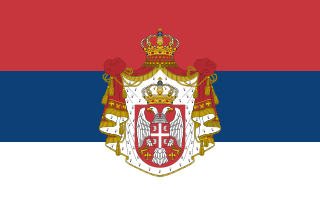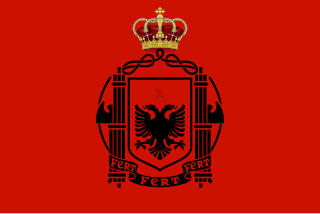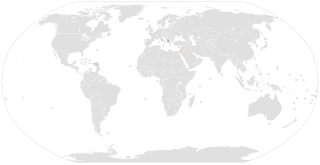| |||||
| Decades: | |||||
|---|---|---|---|---|---|
| See also: | Other events of 1918 List of years in Albania | ||||
The following lists events that happened during 1918 in the Principality of Albania .
| |||||
| Decades: | |||||
|---|---|---|---|---|---|
| See also: | Other events of 1918 List of years in Albania | ||||
The following lists events that happened during 1918 in the Principality of Albania .

Albania, officially the Republic of Albania, is a country in Southeast Europe. It is in the Balkans, on the Adriatic and Ionian Seas within the Mediterranean Sea, and shares land borders with Montenegro to the northwest, Kosovo to the northeast, North Macedonia to the east and Greece to the south. With an area of 28,748 km2 (11,100 sq mi), it has a varied range of climatic, geological, hydrological and morphological conditions. Albania's landscapes range from rugged snow-capped mountains in the Albanian Alps and the Korab, Skanderbeg, Pindus and Ceraunian Mountains, to fertile lowland plains extending from the Adriatic and Ionian seacoasts. Tirana is the capital and largest city in the country, followed by Durrës, Vlorë, and Shkodër.

The Kosovo War was an armed conflict in Kosovo that lasted from 28 February 1998 until 11 June 1999. It was fought between the forces of the Federal Republic of Yugoslavia, which controlled Kosovo before the war, and the Kosovo Albanian separatist militia known as the Kosovo Liberation Army (KLA). The conflict ended when the North Atlantic Treaty Organization (NATO) intervened by beginning air strikes in March 1999 which resulted in Yugoslav forces withdrawing from Kosovo.

Kosovo, officially the Republic of Kosovo, is a country in Southeast Europe with partial diplomatic recognition. Kosovo lies landlocked in the centre of the Balkans, bordered by Serbia to the north and east, North Macedonia to the southeast, Albania to the southwest, and Montenegro to the west. Most of central Kosovo sits on the plains of Metohija and the Kosovo field. The Accursed Mountains and Šar Mountains rise in the southwest and southeast, respectively. Kosovo's capital and largest city is Pristina.

Tirana is the capital and largest city of Albania. It is located in the centre of the country, enclosed by mountains and hills, with Dajti rising to the east and a slight valley to the northwest overlooking the Adriatic Sea in the distance. It is among the wettest and sunniest cities in Europe, with 2,544 hours of sun per year.

The flag of Albania depicts a silhouetted black double-headed eagle in the center of a red background. The red stands for bravery, strength, valour and bloodshed, while the Eagle – traditionally the symbol of Albanians – represents the sovereign state of Albania. The flag was established as the national flag of Albania when the country gained its independence from the Ottoman Empire in 1912.

Gjakova or Đakovica is the seventh largest city of Kosovo and seat of Gjakova Municipality and Gjakova District. The city has 40,827 inhabitants, while the municipality has 94,556 inhabitants.

Albania was represented at the 2004 Summer Olympics in Athens by the National Olympic Committee of Albania.

The Albania national football team represents Albania in men's international football. It is governed by the Albanian Football Federation (FSHF), the governing body for football in Albania. It is a member of UEFA in Europe and FIFA in global competitions. The team's colours reference two national symbols: the double-headed eagle and the country's tricolor. Their supporters are colloquially referred to as the Tifozët Kuq e Zi.

The Kingdom of Serbia was a country located in the Balkans which was created when the ruler of the Principality of Serbia, Milan I, was proclaimed king in 1882. Since 1817, the Principality was ruled by the Obrenović dynasty. The Principality, under the suzerainty of the Ottoman Empire, de facto achieved full independence when the very last Ottoman troops left Belgrade in 1867. The Congress of Berlin in 1878 recognized the formal independence of the Principality of Serbia, and in its composition Nišava, Pirot, Toplica and Vranje districts entered the South part of Serbia.

The Kingdom of Montenegro was a monarchy in southeastern Europe, present-day Montenegro, during the tumultuous period of time on the Balkan Peninsula leading up to and during World War I. Officially it was a constitutional monarchy, but absolutist in practice. On 28 November 1918, following the end of World War I, with the Montenegrin government still in exile, the Podgorica Assembly proclaimed unification with the Kingdom of Serbia, which itself was merged into the Kingdom of Serbs, Croats and Slovenes three days later, on 1 December 1918. This unification with Serbia lasted, through various successor states, for almost 88 years, ending in 2006.
The Battle of Saranda took place in southern Albania between the Greeks and the Italians in December 1940, during the Greco-Italian War in World War II.

The Qemal Stafa Stadium, named after Qemal Stafa (1920–1942), a World War II hero, was a national stadium and the largest football stadium in Tirana, Albania. Construction started in 1939 and the stadium was inaugurated in 1946 for the Balkan Cup, which was won by the Albania national football team. The stadium has been used for football matches of the Albanian Superliga and the national team, athletic events, and the six Albanian Spartakiads. Although it was enlarged in 1974 to accommodate up to 35,000 spectators, in the 1990s it became an all-seater stadium, and its capacity was reduced to 19,700.

The Italian protectorate of Albania, also known as Italian Albania, the Kingdom of Albania or Greater Albania, existed as a puppet state and protectorate of Fascist Italy. It was practically a union between Italy and Albania, officially led by Italian King Victor Emmanuel III and his government: Albania was led by Italian governors, after being militarily occupied by Italy, from 1939 until 1943. During this time, Albania ceased to exist as an independent country and became an autonomous part of the Italian Empire. Officials intended to make Albania part of a Greater Italy by assimilating Albanians as Italians and colonizing Albania with Italian settlers from the Italian Peninsula to transform it gradually into an Italian land.

The Albanian Declaration of Independence was the declaration of independence of Albania from the Ottoman Empire. Independent Albania was proclaimed in Vlorë on 28 November 1912. Six days later the Assembly of Vlorë formed the first Government of Albania which was led by Ismail Kemal and the Council of Elders (Pleqnia).

The Corfu Channel incident consists of three separate events involving Royal Navy ships in the Channel of Corfu which took place in 1946, and it is considered an early episode of the Cold War. During the first incident, Royal Navy ships came under fire from Albanian fortifications. The second incident involved Royal Navy ships striking mines; and the third occurred when the Royal Navy conducted mine-clearing operations in the Corfu Channel, but in Albanian territorial waters, and Albania complained about them to the United Nations.

Albania has recognized Israel as a state since April 19, 1949. Diplomatic relations between the countries were established on August 19, 1991. Albania has an embassy in Tel Aviv and Israel has an embassy in Tirana.

Postage stamps from Albania are marked Shqiperia, Shqiperise and Shqiptare.

In World War I, Albania had been an independent state, having gained independence from the Ottoman Empire on 28 November 1912, during the First Balkan War. It was recognised by the Great Powers as the Principality of Albania, after Turkey officially renounced all its rights in May 1913. Being a fledgling new country, it quickly unravelled and just a few months after taking power, its German ruler, Prince Wilhelm, was forced to flee. After World War I broke out, anarchy took hold of the country as tribes and regions rebelled against central rule. To protect the Greek minority, Greek control was established in the southern districts replacing the Northern Epirote units beginning in October 1914. In response to this, Italy, although officially neutral at the time, also sent troops into the port of Vlorë, while Serbia and Montenegro took control of northern regions. In 1915 Serbia was overrun by combined German, Austro-Hungarian, and Bulgarian forces; the Serbian army retreated across the mountain passes of northern Albania, towards the Adriatic. Italian troops drove the Greeks from southern Albania and brought almost all Albanian territory under their control. Austrian forces invaded in June 1916; Austro-Hungarian forces remained in Albania until the end of the war when a multinational Allied force broke through and pushed them out in 1918.

Lumë is a region that extends itself in northeastern Albania and southwest Kosovo whose territory is synonymous with the historic Albanian tribe (fis) of the same name. It includes the village with the same name, Lumë, which is located in Albania. Luma is surrounded by Has region, Fan and Orosh (west), Reçi and M’Ujë e m’Uja, Upper Reka, Gora (east), Opoja and Vërrini of Prizren. The region itself also includes the small Arrëni tribe in the west and the Morina tribe in the east.
The following lists events that happened during 2001 in Republic of Albania.